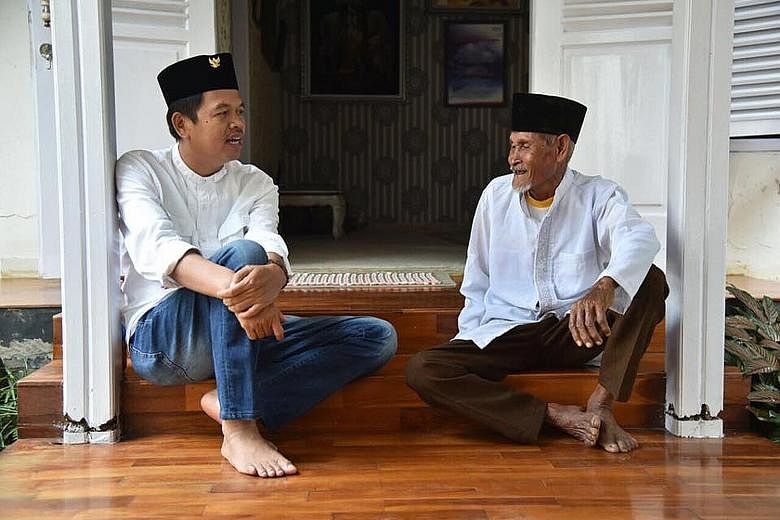He is a close ally of President Joko Widodo and known for promoting religious tolerance.
Mr Dedi Mulyadi, 46, is also credited with helping to turn Purwakarta, a regency of some 800,000 people in West Java, from a sleepy industrial town into a popular tourist destination hailed for its open and inclusive community.
Now, the regent of Purwakarta plans to take his vision - creating a society where Indonesians of various races and religions can live in harmony and thrive - to a bigger stage, by running in the West Java gubernatorial election next year.
West Java, whose capital is Bandung, is Indonesia's most populous province and home to 46 million.
"One of the obligations of administrators of the state is to create an atmosphere of harmony and tolerance," said Mr Dedi in February after he received the Harmoni Award from the Ministry of Religious Affairs, in recognition of his efforts to promote religious tolerance.
Since he announced in June his plan to run, he has built a very strong coalition, to the surprise of many. He has won support from the country's two largest political parties, Golkar and the Indonesian Democratic Party of Struggle, which also backed Mr Joko's bid for the presidency in 2014. Last week, Hanura, one of the parties in Mr Joko's ruling coalition, threw its weight behind Mr Dedi.
This means he has now secured at least 40 of the 100 seats in the West Java Parliament.
With about 30 million eligible voters, West Java province is a key election battleground, and a victory for Mr Dedi there would be a boost for Mr Joko, popularly known as Jokowi, who will run for re-election in 2019.
Mr Dedi's rivals might include West Java deputy governor Deddy Mizwar, his predecessor Dede Yusuf, Prosperous Justice Party president Sohibul Iman and popular Bandung Mayor Ridwan Kamil.
Mr Dedi was born in West Java's Subang regency. His father was formerly a member of the Indonesian National Armed Forces, but retired early due to poor health. His mother worked as a rice field labourer to support the family.
Mr Dedi moved to Purwakarta to study law, and began his political career as a member of Purwakarta's House of Representatives for Golkar. He rose to become Purwakarta deputy regent in 2003, and was elected regent in 2008.
The father of two said he is satisfied with what he has achieved in his nine years as regent.
"People here are happy, but it is time now for me to serve the people in the whole province," he added.
Golkar's West Java executive board secretary, Mr Ade Barkah, said Mr Dedi is already well known, particularly in the rural areas of Purwakarta, and did not expect any issues in terms of winning votes.
Still, pressure from religious conservatives can be an issue these days. In Jakarta, mass protests by groups such as the hardline Islamic Defenders Front (FPI) led to the imprisonment of Chinese-Christian politician Basuki Tjahaja Purnama in May for blasphemy against Islam. Basuki lost in the elections to the Muslim pairing of Mr Anies Baswedan and Mr Sandiaga Uno from the opposition Gerindra Party.
When asked if he was concerned that his pro-pluralist agenda could be hijacked by hardline groups during his run for governor, Mr Dedi, who is Muslim, told The Straits Times that West Java is not a conservative Muslim province.
"The majority here are moderate Muslims, evidenced by the fact that nationalist parties, not the Islamic- leaning parties, have dominated seats in local Parliaments across West Java," he said.
Mr Dedi recalled a fiery debate between himself and a small group of men from the local branch of FPI, who claimed that statues of Hindu and Buddhist deities and demigods commonly seen around Purwakarta had encouraged idol worship, considered a sin in Islam.
He said he not only stood his ground against the men, but also continued to vigorously promote Purwakarta's diversity, using the statues as a sign of how different cultures and religions can coexist.
He said radical groups such as FPI must be fended off by reminding Indonesians of their national motto, Bhinneka Tunggal Ika, which means "unity in diversity".
He said his long-term goal is to reshape Indonesia and put it back on the right track as a pluralist nation where people of various races and religions can coexist in peace, just as they did when he was a child.
He feels proud that Purwakarta, under his watch, became one of the few towns in Indonesia where public schools must have places of worship for students of all six faiths in the country, from Islam to Christianity. He also ordered that all religious teachers be hired by the municipal government, to ensure that schools did not teach only Islam.
"My kindergarten teacher was Catholic... my closest classmate then was an Ahmadiyah (a minority Muslim sect), but we are all naturally tolerant," he said. "Development in Indonesia must be based on our national ideology, which promotes pluralism."

